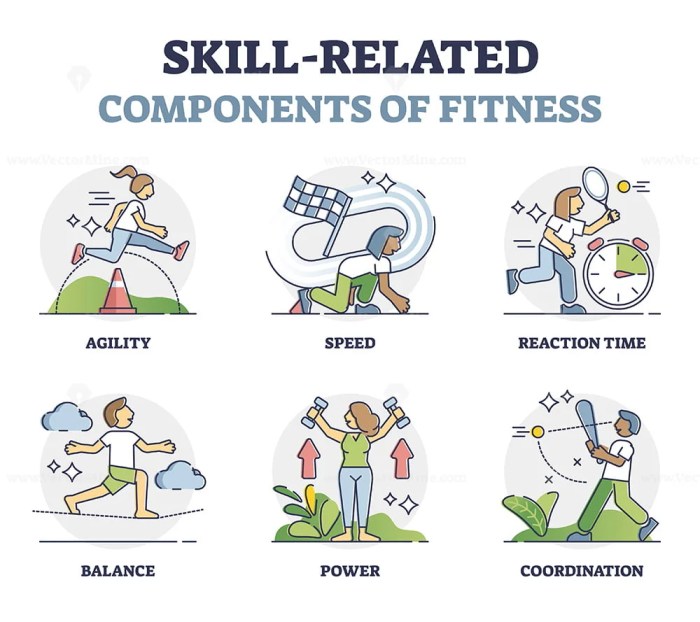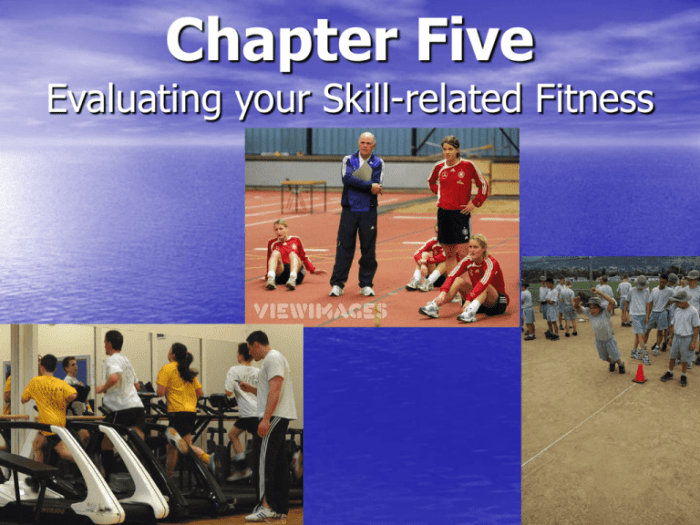Declining skill or fitness level is a prevalent concern that affects individuals across the lifespan. This multifaceted issue encompasses physiological, psychological, cognitive, and lifestyle factors, significantly impacting overall well-being. Understanding the causes, manifestations, and strategies for mitigating this decline is crucial for promoting healthy aging and maintaining optimal quality of life.
The physiological and psychological underpinnings of declining skill or fitness level are complex and multifaceted. Age-related changes, genetic predispositions, and lifestyle choices play significant roles in this process. As we age, our bodies undergo a gradual reduction in muscle mass, strength, and flexibility, leading to decreased mobility and impaired coordination.
These physical changes are often accompanied by cognitive decline, affecting memory, attention, and problem-solving abilities.
Factors Contributing to Declining Skill or Fitness Level
Declining skill or fitness level is a natural consequence of aging, but it can also be influenced by other factors. Physiological factors, such as decreased muscle mass and flexibility, reduced aerobic capacity, and slower reaction times, all contribute to a decline in physical performance.
Psychological factors can also play a role, such as decreased motivation, loss of confidence, and fear of injury. Age-related changes in the brain, such as reduced cognitive function and processing speed, can also affect skill and fitness levels.
Genetics
Genetics play a role in determining an individual’s physical potential and the rate at which they decline with age. Some people are naturally more athletic and have a higher fitness level than others. However, even those with good genetics will experience some decline in skill and fitness as they age.
Lifestyle
Lifestyle factors, such as diet, exercise, and sleep, can also impact skill and fitness levels. A healthy diet, regular exercise, and adequate sleep can help to maintain muscle mass, flexibility, and aerobic capacity, and reduce the risk of injury.
Physical Manifestations of Declining Skill or Fitness Level

As individuals age or experience prolonged periods of inactivity, their physical capabilities undergo noticeable changes. These manifestations serve as indicators of declining skill or fitness level and can significantly impact overall well-being.
The physical manifestations of declining skill or fitness level encompass a wide range of observable alterations, including reduced mobility, decreased strength, and impaired coordination.
Reduced Mobility, Declining skill or fitness level
- Stiffness and decreased range of motion in joints
- Difficulty performing everyday tasks that require flexibility, such as reaching overhead or bending down
- Slower gait and reduced walking distance
Decreased Strength
- Loss of muscle mass and strength, leading to reduced lifting capacity and diminished power
- Difficulty performing activities that require physical exertion, such as carrying heavy objects or climbing stairs
- Weakened grip strength, making it challenging to open jars or hold objects securely
Impaired Coordination
- Reduced balance and stability, increasing the risk of falls
- Difficulty with fine motor skills, such as writing or buttoning clothing
- Slower reaction times and reduced agility
Cognitive Impact of Declining Skill or Fitness Level

As individuals experience a decline in their skill or fitness levels, they may also face cognitive challenges. These challenges can manifest in various ways, affecting memory, attention, and problem-solving abilities.
Memory Impairment:Declining skill or fitness levels have been linked to difficulties in encoding and retrieving information from memory. Studies have shown that individuals with lower levels of physical activity tend to have poorer memory performance, particularly in tasks involving episodic memory (recalling specific events) and working memory (holding information in mind for short periods).
Attention Deficits
Attention is a crucial cognitive function that allows individuals to focus on relevant information while filtering out distractions. Declining skill or fitness levels can impair attentional processes, leading to difficulties in sustaining focus, shifting attention between tasks, and suppressing irrelevant information.
Problem-Solving Impairments
Problem-solving requires the ability to think flexibly, generate solutions, and evaluate their effectiveness. As skill or fitness levels decline, individuals may experience difficulties in these areas, making it harder for them to solve problems efficiently and creatively.
Strategies to Mitigate Declining Skill or Fitness Level

As individuals progress through life, maintaining optimal skill and fitness levels can become increasingly challenging. However, by implementing a comprehensive plan that encompasses physical exercise, cognitive training, and lifestyle modifications, it is possible to mitigate the decline and preserve both physical and mental well-being.
The following table Artikels specific strategies within each category:
Physical Exercise
- Engage in regular aerobic activities, such as brisk walking, swimming, or cycling, to improve cardiovascular health and endurance.
- Incorporate strength training exercises using weights or resistance bands to maintain muscle mass and strength.
- Practice balance and coordination exercises, such as yoga or tai chi, to enhance stability and prevent falls.
- Consider high-intensity interval training (HIIT) to maximize fitness gains in a shorter amount of time.
Cognitive Training
- Engage in mentally stimulating activities, such as reading, puzzles, or learning a new language, to improve cognitive function.
- Practice mindfulness meditation or deep breathing exercises to reduce stress and improve focus.
- Participate in social activities that involve intellectual discussions or problem-solving.
- Consider cognitive rehabilitation programs designed to enhance memory, attention, and executive function.
Lifestyle Modifications
- Maintain a healthy diet rich in fruits, vegetables, and whole grains to provide essential nutrients for physical and cognitive health.
- Get adequate sleep to allow for physical and cognitive recovery.
- Limit alcohol consumption and avoid smoking to minimize the negative impact on overall health.
- Manage stress through healthy coping mechanisms, such as exercise, meditation, or spending time in nature.
Case Studies of Successful Mitigation

Numerous individuals have successfully mitigated declining skill or fitness levels through targeted interventions and lifestyle modifications. These case studies provide valuable insights into the strategies and approaches that can lead to positive outcomes.
One notable example is that of former professional basketball player Michael Jordan. After retiring from the NBA in 1993, Jordan experienced a decline in his physical abilities. However, through a rigorous training regimen and lifestyle changes, he successfully regained his fitness and returned to the NBA in 1995, leading the Chicago Bulls to three consecutive championships.
Specific Interventions and Lifestyle Changes
The following are some of the specific interventions and lifestyle changes that have been associated with successful mitigation of declining skill or fitness level:
- Regular exercise: Engaging in regular physical activity, such as cardiovascular exercise, strength training, and flexibility exercises, can help maintain and improve physical function.
- Healthy diet: Consuming a balanced diet that is rich in fruits, vegetables, and whole grains can provide the body with the nutrients it needs to support physical activity and recovery.
- Adequate sleep: Getting enough sleep allows the body to repair and regenerate tissues, which is essential for maintaining physical and cognitive function.
- Stress management: Engaging in stress-reducing activities, such as yoga, meditation, or spending time in nature, can help reduce the negative effects of stress on physical and mental well-being.
- Social support: Having a strong support system of friends, family, or peers can provide motivation and encouragement for maintaining a healthy lifestyle.
Impact on Quality of Life

Declining skill or fitness level can have a significant impact on overall quality of life. It can lead to a range of negative consequences, both physical and psychological.
Physically, declining skill or fitness level can make it difficult to perform everyday tasks, such as climbing stairs, carrying groceries, or playing with children. This can lead to a loss of independence and a decrease in overall mobility. It can also increase the risk of falls and other accidents.
Emotional Consequences
Emotionally, declining skill or fitness level can lead to feelings of frustration, sadness, and depression. It can also damage self-esteem and confidence. People who are struggling with declining skill or fitness level may feel like they are losing their sense of purpose or identity.
Social Consequences
Socially, declining skill or fitness level can lead to isolation and loneliness. It can be difficult to participate in activities with friends and family if you are unable to keep up physically. This can lead to a loss of social support and a decrease in overall well-being.
Financial Consequences
Financially, declining skill or fitness level can lead to increased healthcare costs. It can also make it difficult to work or earn a living, which can lead to financial hardship. In some cases, declining skill or fitness level can even lead to homelessness.
FAQ Section
What are the primary causes of declining skill or fitness level?
The primary causes of declining skill or fitness level include age-related physiological changes, genetic predispositions, and lifestyle factors such as physical inactivity, poor nutrition, and inadequate sleep.
How does declining skill or fitness level affect cognitive function?
Declining skill or fitness level can affect cognitive function by reducing blood flow to the brain, impairing neurotransmitter production, and increasing inflammation, which can lead to memory loss, attention deficits, and impaired problem-solving abilities.
What are some effective strategies for mitigating declining skill or fitness level?
Effective strategies for mitigating declining skill or fitness level include regular physical exercise, cognitive training exercises, and lifestyle modifications such as a balanced diet, adequate sleep, and stress management.